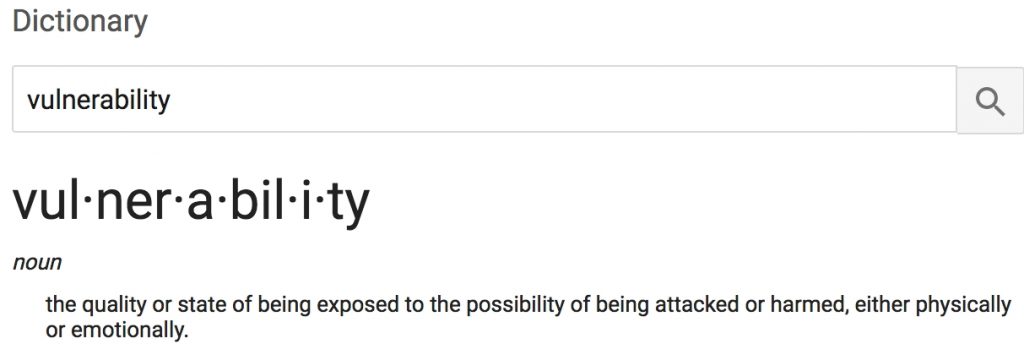In my psychotherapy practice, I often hear clients express their deepest longings and fears:
“I’m afraid that I am incapable of creating meaningful connections in my life. I don’t want to have to say what I really feel.”
“I’m afraid if I try to express my true needs and hurts to my partner, I will lose her, and the grass will not be greener on the other side.”
“What if I ask for what I want in my relationship and he laughs at me or gets mad about my requests? Isn’t having needs selfish?”
Sometimes, I hear confessions about the heart of the matter:
“I’m afraid to be vulnerable. It’s scary.”
From my vantage point, my perch on my comfy blue therapist’s chair, I can easily see the beauty and possibility in what the world and these challenging relationships are offering my clients: an opportunity to be courageous, to transcend their fear and grow into a larger, more expanded version of themselves, to connect more intimately to the people they care about. The therapist in me occasionally even gets excited at the prospect. “Awesome! Let’s go! Let’s have that hard conversation! You got this!” Part of that optimistic perspective comes from the inspiration of great teachers, such as Brené Brown, and the author Anaïs Nin, one of my favorites, who said:
“Life shrinks or expands in proportion to one’s courage.”
Another piece of that mindset comes from having taken some of those risks myself in the past and finding myself supported, held and heard by generous, open-hearted souls who were willing to put their egos, assumptions, and self-righteousness aside to bear witness to my expressed needs, fears, or grief. Other life situations have found me with thoughtful, kind and understanding people who have taken my sensitivity into consideration and used diplomacy when offering important feedback about a possible blind-spot. These experiences have been some of the most profoundly healing and heartfelt experiences of my life. It is because of the tremendous gift of connection I received from them that I have become an advocate and defender of vulnerability. I champion its cause whenever I can.
But from my seat, I sometimes forget how different the subjective experience of vulnerability, especially vulnerability ‘gone wrong’ can be. I forget the fact that not every experience of vulnerability is of the Brené Brown variety: an expression of strength and courage in the service of connection and growth. I forget the more common definition of vulnerability:
Exposure to an attack. That’s the actual definition.
An emotional attack can be absolutely brutal, the wounds often lasting much longer than those received in a physical attack. Especially for individuals who have a history of emotional abuse or neglect, a criticism received in an emotional state of exposure can trigger a succession of negative memories and core beliefs and can very easily lead to feelings of worthlessness, self-blame and self-doubt. It can spiral into a loss of confidence, debilitating self-criticism and depression. In extreme cases, it may lead to self-harm or acts of aggression toward others.
Being vulnerable can be really painful.
As an adult, I have been able to create the best possible conditions in my life. I choose carefully the people and places that feel safe enough to express my vulnerability. But just like everyone, I am occasionally caught off guard. When I have an experience in my life now of feeling caught unprotected, subjected to someone else’s judgment, lack of care or outright personal attack, I am jolted into that pain of feeling deeply hurt. It can be a harsh reminder that those experiences do exist, and can happen quite often depending on how powerless, sensitive, or open an individual is. Being vulnerable can be scary, and therefore it’s not something that we always choose nor should we.
So how do we walk that line… wanting connection but fearing reproach…? Living in a way that is hyper-vigilant, always being on-guard for potential dangers and staying away from relationships altogether for fear that we may become re-wounded hardly makes for a life of joy, spontaneity or connection. Unfortunately, we can not plan for blind spots. Being caught-off guard by someone we thought would be safe will happen to us all.
So what’s a human who recognizes both the pain and power of vulnerability to do? Here are a few ideas:
When getting to know someone new: Use the Share/Check method in conversation.
- Share some information, perhaps a more superficial bit of information about yourself or your experiences, and then pause, and check in with the other person: what did they hear of what you said? How closely were they listening? Do they seem considerate? Sensitive to your needs? Deepen the level of emotional intimacy and sharing only when you’ve come to trust that what you share will be held with kindness and respect.
Reduce your exposure to insensitive, offensive or otherwise unsafe people.
- This sounds simple, but it isn’t always easy. Especially when the people who are closest to us, our family members, are those most guilty of these betrayals of the heart. If you are struggling with how to maintain a connection that feels toxic, unhealthy, or hurtful, reach out to a professional for help and explore for yourself where you can safely draw some boundary lines to prevent further hurts.
When you’re caught off guard by a real or perceived attack: Practice Self Compassion
- When someone responds to your opening your doors to them, your sharing your world, with condemnation or judgment, remember your own inherent goodness. Repeating the mantra ‘I’m doing the best that I can” in a kind, gentle voice as you breathe can provide some soothing, some recollection that you are indeed worthwhile, your intentions are good, and that even through this tough experience, you are growing in kindness and compassion.



Beautifully written–I love this reminder that vulnerability doesn’t always feel good and that as adults we get to be intentional with who we choose to open up to. Thank you!
Yes to all of this. I am moved by how well you write Rachael and also by your strength shown through such wise gentleness.